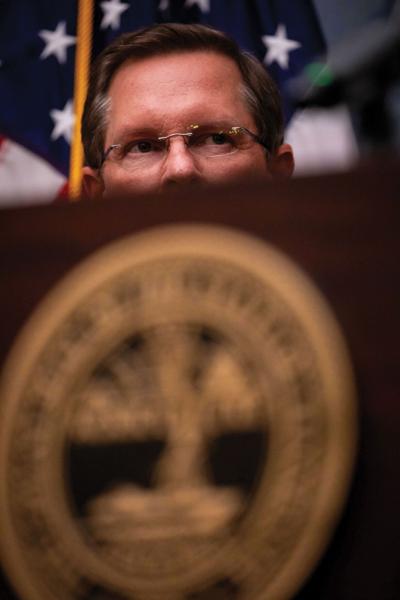
Speaker Cameron Sexton, April 2025
The constitutionality of legislation is often debated on Capitol Hill — but sometimes passing bills that are blatantly unconstitutional is the point, especially in a supermajority.
That was especially clear during the recent debate over House Bill 793/Senate Bill 836, Republican-sponsored legislation that would allow local school boards to deny enrollment or charge tuition to undocumented children. While the bill passed the Senate, it was held up in the House after its sponsor, House Majority Leader William Lamberth (R-Portland), voiced last-minute concerns that it could result in the loss of billions of dollars of federal funding.
The bill stands in opposition to the 1982 U.S. Supreme Court ruling in Plyler v. Doe, which upheld the right to public education for all students regardless of their immigration status. Rep. Gino Bulso (R-Brentwood) called that decision an “abomination” during the March 26 House Education Committee, and argued that the ruling happened because the then-liberal-majority high court “completely misread the Equal Protection Clause.” When asked by committee Chair Scott Cepicky (R-Culleoka) if the bill would immediately be challenged in the courts, Lamberth signaled yes.
“I would certainly hope not, but it is definitely a possibility if someone were to bring suit,” Lamberth said, calling the bill “very fair.”
“I believe the Supreme Court is going to have to take a long look at not only Plyler v. Doe, but I think it’s going to trigger the federal government to look at federal immigration policy,” Cepicky said. “If Plyler v. Doe would happen to stand, maybe the federal government will finally step up and say, ‘We’ll send the states the money to be able to fund these students.’”
“Unfortunately, we see litigation being passed, not just legislation,” says Senate Democratic Caucus Chair Raumesh Akbari (D-Memphis). “It is a tactic of my colleagues, and you see, with the [state] attorney general’s budget being more than doubled in the last couple of years, they are defending more and more lawsuits.”
“We’ve asked for numbers, disaggregated numbers, to show how much these lawsuits are costing taxpayers, and unfortunately, that data never seems to be available,” Akbari continues. “My real concern is that there are real people who are impacted by these political ploys to overturn existing law.”
“It starts with there being a problem — in order to solve the problem, you have to attack what we consider to be an erroneous Supreme Court precedent,” Bulso tells the Scene, adding that he believes there’s an “opportunity” to overturn the 2015 decision in Obergefell v. Hodges, which legalized same-sex marriage. “If looking for other precedents that at some point, at an appropriate time, would need to be challenged, that would certainly be one of them.”
Bulso’s 2025 Tennessee Covenant Marriage Act, which in part recognizes marriage as being only between one man and one woman, floundered during the session. But it could be taken up again next year.
“Sometimes we file bills that may be considered unconstitutional under current case precedent, but perhaps the court should and might revisit some of those decisions,” says Senate Majority Leader Jack Johnson (R-Franklin), noting the Supreme Court’s 2022 overturning of Roe v. Wade, which then triggered Tennessee’s nearly total abortion ban.
Other bills aren’t aiming at reversal from the high court, but are sponsored in part to establish a precedent to begin with — such as 2023’s HB 1/SB 1, which effectively banned gender-affirming care for minors and went into effect in July 2023.
Johnson sponsored that bill in the Senate, and Lamberth sponsored it in the House. The law is now at the center of United States v. Skrmetti, which was argued before the Supreme Court in December. A decision is expected this summer.
“Now it’s pending before the United States Supreme Court, so they’re going to decide on this issue, and we will be the test case for the entire country,” says Johnson, adding that he was “humbled” and “honored” by the “somewhat overwhelming” experience of watching the court debate a law that he championed.
“Only recently are you seeing the legislative process being abused to limit people’s rights and to limit their liberties and freedoms,” House Democratic Caucus Chair John Ray Clemmons (D-Nashville) tells the Scene. “And so that’s really troubling.”
The good, the bad and the ugly from the 2025 session of the Tennessee General Assembly






